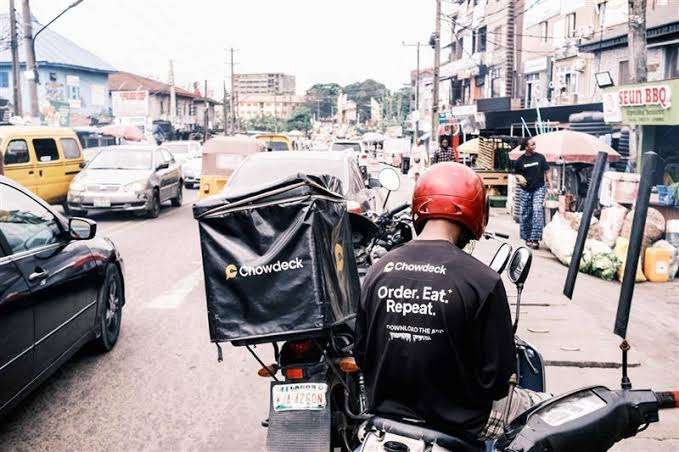Food delivery startups in Africa has seen an explosion of innovation in recent years. From hyperlocal logistics to full-stack ghost kitchens, startups across the continent are reimagining how people order, prepare, and receive food.
With urbanisation on the rise and mobile internet access growing, the sector is heating up, attracting funding, talent, and fierce competition. Here, Techparley provides a list of 10 of the most innovative food delivery startups in Africa.
1. Chowdeck
Chowdeck has quickly emerged as one of the ost prominent food delivery startups in Africa. With an app interface designed for speed and reliability, Chowdeck is widely praised for its professional delivery riders and consistent customer support, both of which have helped the company cultivate a loyal user base across Nigeria’s major urban centres.
Chowdeck’s backend tech ensures swift order processing, even during peak hours, and the company has experimented with loyalty rewards and subscription models to keep customers engaged. With growing interest from investors and plans to expand beyond Nigeria, Chowdeck is fast becoming a defining name in African food delivery innovation.
2. Glovo
Glovo has established a solid presence across several African countries, including Kenya, Ghana, Nigeria, Morocco, and Côte d’Ivoire. The company provides food delivery, grocery shopping, and courier services within a single app, catering to the growing need for fast, on-demand urban logistics.
The company invests in logistics infrastructure, including micro-fulfilment centres and delivery rider training, to maintain high service standards. In West Africa, it has also become a staple app for urban professionals, while in North Africa, it competes with a mix of homegrown and regional rivals.
3. Yummeals
Yummeals is a Lagos-based foodtech startup that’s redefining food delivery in Africa through a full-stack model of ghost kitchens and decentralised delivery hubs. Launched in 2025, Yummeals addresses common urban food challenges, ranging from affordability to delivery time, with an end-to-end system.
The brand operates from a flagship ghost kitchen in Yaba and is rapidly expanding to locations like Surulere, Ikeja, and Lekki, offering users high-quality, consistent meals at accessible prices. With a strong focus on everyday Nigerian meals, Yummeals is becoming a staple for Lagos residents who crave local dishes without the delay.
4. Mr D Food
Mr D Food, a legacy player in South Africa’s food delivery space, has built a solid reputation through consistent service, strong vendor partnerships, and user-friendly technology. Mr D has capitalised on its parent company’s logistics network to create one of the most efficient food delivery platforms in the region.
Customers can order from hundreds of restaurants in cities like Johannesburg, Cape Town, and Durban with real-time tracking and prompt delivery. The platform stands out for its seamless integration with South African payment systems, frequent discount campaigns, and extensive restaurant listings.
5. Bolt Food
Bolt Food is the food delivery arm of Bolt, the popular ride-hailing platform operating in over 10 African countries. Since entering the foodtech space, Bolt Food has made significant strides in cities such as Lagos, Accra, and Cape Town. By leveraging its existing rider and driver network, Bolt Food can quickly scale logistics for meal deliveries with minimal friction.
The Bolt app interface allows seamless switching between ride-hailing and food delivery, offering convenience and cross-platform synergy for users. What makes Bolt Food competitive is its dynamic pricing model, fast delivery times, and low commission rates for restaurant partners.
6. Jumia Food
Jumia Food is one of the most established food delivery startups in Africa, with operations in Nigeria, Kenya, Uganda, and Côte d’Ivoire. As a spinoff of the broader Jumia e-commerce platform, Jumia Food enjoys access to robust infrastructure and a large customer base. Users can order food, groceries, and even beverages from hundreds of vendors, all within a single app.
The platform’s interface is designed for simplicity, and it integrates smoothly with mobile money and local payment systems. Jumia Food is uniquely equipped to handle scale and cross-border expansion. It remains a top choice for customers seeking reliability and range.
7. Kune
Kune Foods launched in Nairobi with the promise of affordable, ready-to-eat meals made in centralised kitchens. Its model involved full control over food production and delivery, cutting out the restaurant middleman. This allowed the startup to offer meals at lower prices while maintaining consistency across its menu.
However, the Kune kitchen model has since been adopted by newer players, including Yummeals in Nigeria. Kune’s story serves as a case study in ambition, market fit, and execution, and its impact on Kenya’s startup ecosystem remains significant.
8. Munch Africa
Munch Africa is a rising star in Uganda’s food delivery scene, particularly in Kampala where it partners with restaurants and fast-food vendors to deliver meals quickly and affordably. With a user-friendly app and a strong logistics arm, Munch has carved out a niche by focusing on hyperlocal delivery.
The platform supports smaller vendors and is known for giving street food sellers and emerging food entrepreneurs digital visibility. Munch’s platform is optimised for low-bandwidth users and integrates easily with mobile money systems like MTN MoMo and Airtel Money, which are prevalent across East Africa.
9. Guddies Planet
Guddies Planet has evolved into a full-service food and snack delivery startup in Lagos. The platform targets both retail customers and corporate clients, offering everything from individual meals to bulk orders for events and offices. It has built a reputation for timeliness, product quality, and creative presentation, which appeals to users looking for reliable food logistics.
Guddies Planet stands out with its hybrid ecommerce model. In addition to meals, customers can order gift boxes, celebration hampers, and event catering services, all through its website and mobile app. Its ability to combine food, gifting, and on-demand delivery makes it a unique player in Nigeria’s crowded delivery market.
10. Efresh
Efresh is a Ghanaian foodtech platform that merges grocery delivery with ready-made meal delivery. Operating primarily in Accra and Kumasi, Efresh focuses on quality ingredients sourced from local farmers and producers. Its platform allows users to order fresh produce, meat, and pantry essentials alongside curated meals prepared in certified kitchens.
This dual offering gives consumers flexibility and promotes healthier eating. With a smooth app experience and strong logistics management, Efresh has positioned itself as more than just a delivery app, it’s a food ecosystem. As demand for convenient and healthier food options grows across West Africa, Efresh is poised to expand its influence.





